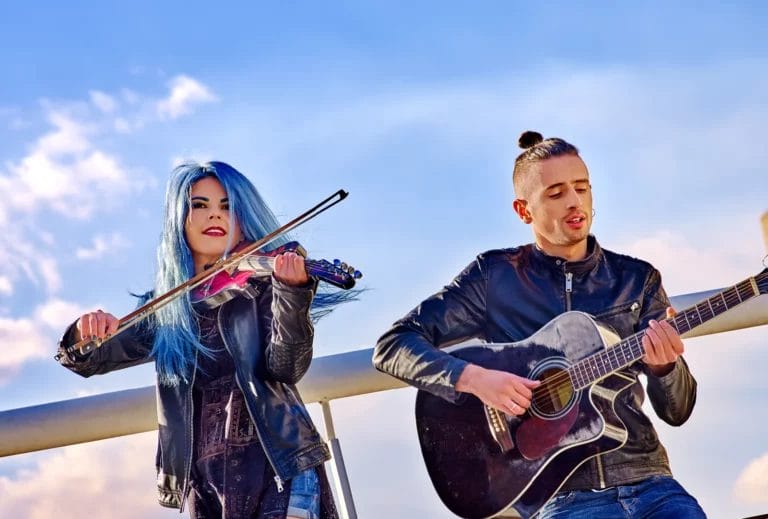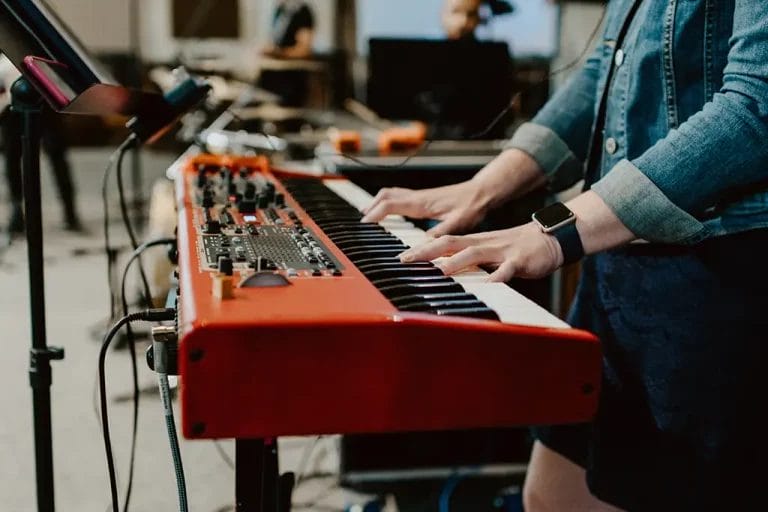- Last Updated:
- 9/16/2024
- Khaleel Hayes
There’s nothing like the rush of performing on stage — the roaring audience applause, the immersive acoustics, and the thrill of wowing others with your music. But you might not get the same rush when promoting yourself as a musician, and we get it.
If you’re banging your head against the wall trying to figure out the best way to market yourself, you’re not alone. You’ve mastered your art, and now it’s time to practice your marketing and advertising talents with these musician promotion ideas.
7 Strategies for Promoting Yourself as a Musician
We get it. Marketing and promoting yourself isn’t the greatest part of being a musician. However, it can ensure more fan outreach, gigs, and recognition for your music. Let’s review these 7 techniques more thoroughly, shall we?
Spark Fan Engagement Off-Stage
Don’t be afraid to brand yourself off-stage. Montana Jackman, musician and audiology expert, explained how the Provo, UT band Homestyle Dinner Rolls engages its audience with videos on social media with comedy and fan interactions.
“Homestyle Dinner Rolls creates comedy content, behind-the-scenes, and off-the-wall silly videos just to make people laugh or think,” he said. “I see comments on their content all the time that [followers] didn’t even realize their TikTok or Instagram channel was a band at first.
“Most nights, at least one of the band members can be found on TikTok LIVE hanging out with audiences of 50-100 users,” Jackman added. “They answer questions, talk to their fans and friends, and take requests.”
Put the Spotlight on Your Credibility
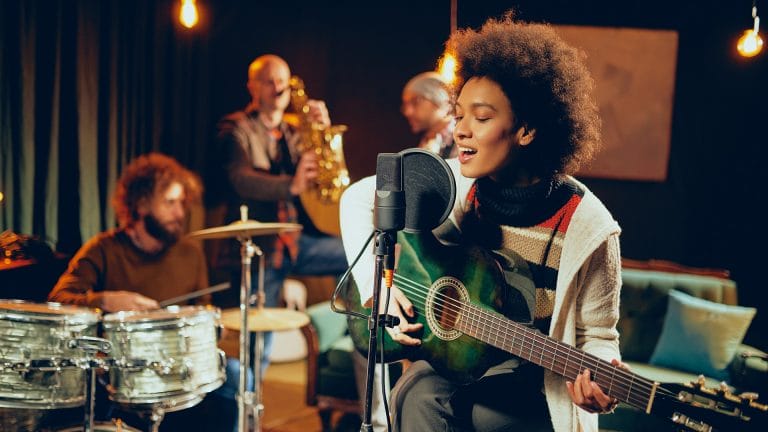
We’ve all heard crazy stories about musicians who are difficult to work with or unreliable. The venues and events you want to book don’t want to work with nightmare performers, they want to work with musicians who have that side of things figured out. Being professional and credible can get you in the door and help you book more music gigs.
Showcase your credibility with:
- Business registration: To get paid and file taxes, you’ll need to have your federal and state business licenses and tax information.
- Licenses and permits: Check local regulations to make sure you have the right credentials to perform at venues and events.
- Musician insurance: Most venues and events will ask you to provide a copy of your general liability Certificate of Insurance (COI) to perform, and some even require it when you apply.
- Professional references: Just as you would for applying for any other job, collect written references from people who hired you in the past to include when you’re asking to book gigs. Even if you did a gig pro bono, someone considering hiring you or collaborating with you can get a sense of what it would be like to work with you.
- Your music credentials: A surprising number of big-time musicians are classically trained instrumentalists and vocalists. Including your qualifications as a professional, serious musician can get you booked and noticed.
Craft a Portfolio of Marketing Materials
You built your music portfolio with care, with songs tailored to evoke emotion and connection. You can do the same thing with promotional materials. For every response you hope to get (e.g., a booked gig, publicity, or music sales), there’s a specific type of marketing material that can help you make the connection.
The marketing collateral you need to promote yourself as a musician includes:
- Business cards with your contact info, logo, stage name, and a URL to your website or music. The more memorable it is, the more it will stand out, so consider things like texture, size, orientation, metallics, die cutting, and so on. Services like Vistaprint make it easy to design, customize, and print cards to promote you as an artist.
- A music press kit to tell others about you and your music, background, inspiration, career highlights, awards and accolades, press mentions, and so on. Include your headshot, photos from appearances, links to your music, website, and socials, reviews and fan testimonials, and quotes that venues or the media can use.
- Flyers/posters (print and digital versions) to showcase upcoming shows, tour dates, and special appearances to locals and social media followers. Use QR codes for easy phone scanning. The more unique the flyer, the more likely others will see it. Even if you’re not super-savvy with graphic design, you can still create eye-catching flyers using a platform like Canva.
- Demo or singles to give others a taste of your music before they hire you for gigs or events, to engage fans on socials, and to help venues and event organizers promote attendance.
- Images and artwork library including a logo or wordmark, album covers, photos from live performances, headshots, and so on. Being able to easily provide these helps promoters, venues, and event organizers market you as a musician, and you can use them for media purposes, like a journalist interviewing you or including a quote from you in a story.
- Press releases for announcements, like when you’re releasing a new single, album, going on tour, or headlining an event. Send them to local newspapers, magazines, radio stations, and podcasters who might want to cover the story, and to newswires for mass exposure using a service like PR Log, which even has a free option. See how to write a press release and get a template to make it easy.
- Postcards you can send to industry contacts, venues, and even fans to market yourself and make announcements about upcoming albums, appearances, and so on.
- Branded merchandise like hats, t-shirts, water bottles and other items you can wear on-stage or at media events, and that your fans can take out and about to build awareness of your brand.
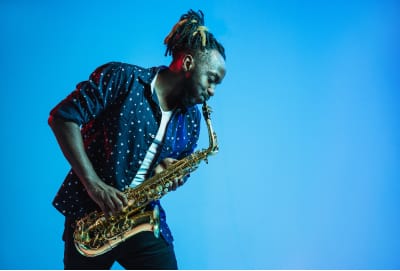
Take the Digital Stage
When you’re not connecting with local venues or fans, reach out to them globally with social media channels, a website, and other platforms for better visibility.
Your website can become the hub of community for your fan base. They can see upcoming news about tours, albums, song release dates, read about your band’s muses, inspiration, and beginnings, watch videos, subscribe for email and SMS text announcements, download music, and more. Include things like:
- Web pages to promote your artistry and music business
- An online store to sell merchandise and music
- A calendar for upcoming appearances, releases, and other dates
- A community forum to give fans a chance to ask questions and connect
- Blog articles to tell the human-interest side of your story
- Links to social profiles and platforms where people can find your music
- A contact form for inquiries
- A form for people to subscribe to email and text updates
- Links to media mentions and press releases
- Reviews and recommendations from people who hired you for past gigs, so people know what it’s like to work with you
Venues and promoters who are deciding whether to hire you can go to your site to get a better feel for your music and whether it would be right for their event or audience. If you’re working with a promoter, having a website they can use to promote you as a musician makes their job even easier — they don’t have to sell you, you’re selling yourself.
Not a web design expert? No problem. All-in-one website builder Wix has an artificial intelligence (AI) site builder that can have the bones of your site up in minutes. From there, you can customize it with photos, videos, a community forum, and even sell merch or music with easy-to-embed tools.
When someone gives you their email address or mobile number to get text updates, rejoice. They are saying they want to know more about you as a musician — they’re down to get news about your appearances, and new music.
If you’re super-active as far as doing live gigs locally, send a monthly or quarterly newsletter letting fans know where they can see you. Include highlights about recent activities, such as photos of major concerts, photos, countdowns to upcoming releases, links to new music or and music videos.
As you compile your next email or text update, think about what you’d want to know about the bands you follow. Design-wise, make sure it’s easy to skim and read on mobile devices, and easy to take action, like forwarding to a friend, checking out your merch, reserving space at your next appearance, and so on.
For you, it’s mass exposure, but for every fan, venue owner, event planner, agent, promoter, or journalist, it’s a one-to-one encounter. Make it count.
Email marketing traditionally produces the highest return of investment of any marketing channel, and the good news here is you can get started with only the cost of your time. Mailchimp lets you get started for free, provides drag and drop editing and pre-made templates, and has a lot of other marketing tools you can use as well.
Gone are the days when artists stood outside the door of their local radio station to get their song on the radio. Nowadays, musicians can get music onto Spotify, YouTube, SoundCloud, Apple Music, and other platforms to reach even more listeners.
Most of these platforms, especially Spotify For Artists, give you in-depth dashboards with analytics to keep track of streams and other vital KPIs.
SoundCloud’s Next Pro feature can match your music with 100 potential listeners for better audience outreach and grow your fanbase.
Apple Music for Artists also provides listening analytics and tips for lyric writing, sharing ideas, recording music, and more.
Creating social media profiles for Facebook, Instagram, X (formerly Twitter), Snapchat, TikTok, YouTube, and more can help you reach more fans and give you global exposure. Plus, each offers targeted advertising options to help you proactively market yourself as a musician, whether you’re looking for local reach or worldwide exposure.
You can also try channels like:
- Discord to create a community forum and engage with fans
- Twitch for live streaming interviews, conversations, practice sessions, and more
- ReverbNation to promote and sell your music
Socials like Facebook also offer live streaming options. For example, the next time you make a local appearance, try live streaming your intro and first song. It could go a long way to bring out more fans to your next gig and you can use it to reach out to other venues and event organizers to book gigs.
Madison Marshall — artist manager and director of digital marketing for Hardin Bourke Entertainment — gave some helpful tips on creating healthy social media profiles for artists, bands, and musicians:
“Pay attention to the first three seconds of any video you post,” Marshall said. “Most people decide to stay or scroll in the first couple seconds. So it’s important to make the start interesting. Look out for the types of content that do well and pick styles that seem like a good fit for you.
“Using a storytelling format is one of the most effective ways to break through the noise,” she continued. “There are over 100,000 new songs being added to Spotify every day. Adding a story people can connect to will likely increase your chances of them sticking around to listen to the music. Everyone loves a good story that makes them feel something.”
Thanks to live streaming platforms, audience interaction has never been easier. Here are some other music-based social channels we recommend:
- Stationhead: Host stream and album release parties. Let individuals connect to their favorite streaming platform so each listener can count as one stream. Reply to comments, co-host with someone else, and speak to audiences between songs for a full interactive experience.
- Bandsintown For Artists: Use geotargeting features to send emails and posts to fans. Set up a tour page to appear on your website and let tour dates automatically appear on your Spotify pages. Boost your fan base with sign-up forms, release pages, contact exporting tools, and more. Integrate this platform with Amazon Music or Shopify to sell more merch.
- Patreon: Share exclusive content through paid subscriptions and interact with fans via real-time comments, direct messages (DMs), group chats and more. Marshall warned: “Patreon takes up a lot of time and energy to do it right. I would only recommend this if you have the proper time to dedicate to it and fans who would be interested in joining.”
- Songkick Tourbox: This platform supports artists, booking agents, and managers with unique tools to promote shows and tours with presale campaigns, audience data, tickets, listings, and more.
- Discord: Create interactive group chats with customizable emojis, stickers, soundboard effects, avatars, and more. Work with high-quality streaming for relaxed, sitting-on-the-couch-with-friends vibes for hosting listening parties or premiering new music videos.
The more you hope to get from your fans, the more you should be giving. Take time to engage with fans in person at concerts and gigs with question and answer sessions, live interviews, autographing merch, taking selfies, and more.
Pull a Stunt to Drive Publicity
In the U.S., there are more than 35,000 professional musicians and singers. That doesn’t even account for the amateurs and occasional musicians and bands who don’t count themselves among that number. And worldwide? The number of musicians you’re competing with for mind and market share is easily in the millions.
Instead of sitting around hoping to attract devoted fans and media coverage (and attention from music moguls), why not create it instead?
A publicity stunt could be the impetus for launching your career as a musician or being able to make it your full time passion. And you won’t need to eat a bat or set up a wardrobe malfunction to pull it off.
Here are some press-worthy publicity stunt ideas you could use to promote yourself as a musician:
- Hold a free concert in the park to benefit a local charity or cause. For example, all donations being donated to support a local school, library, or food bank.
- Film a music video at a famous local venue or site
- Live stream a venue appearance
- Collaborate with other artists for a joint concert or fundraising event
- Hold a contest and let your fans up-vote to name your next album, song, or album artwork
- Give out exclusives at a large event (like a food or music festival) like a QR Code that takes people to a link where they can hear your new song before it gets released
Sell Merch
Selling branded merchandise like t-shirts, water bottles, hats, albums (vinyl, CD, or cassettes), frisbees, and more can score you cool points with fans and concertgoers. Why? When fans wear your merch, they’re saying they connect with you and your artistry.
Like walking billboards, when people wear or use your merch in real life, others may ask about you or your band, leading to word-of-mouth and marketing you didn’t have to do yourself.
Some great places to create merch like t-shirts, hoodies, and more include:
Share the Stage by Building Connections
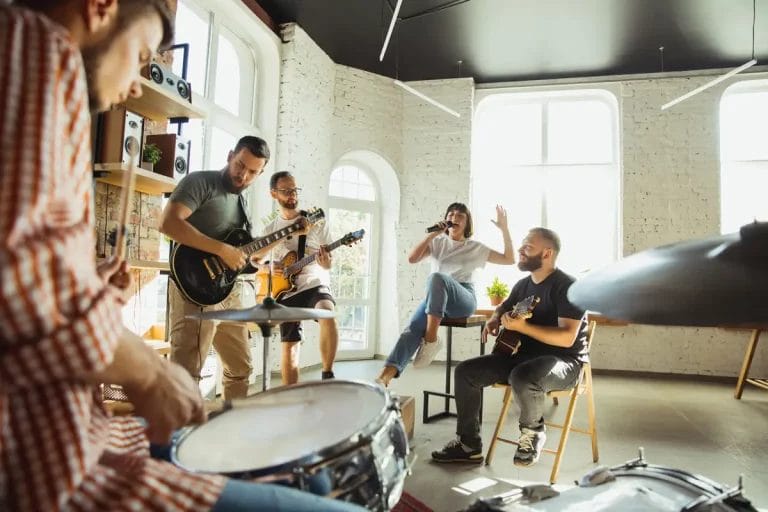
Entering the music industry shouldn’t feel like The Hunger Games, with every person for themselves just hoping the odds are in their favor.
Here are a few ways you can “play nice” with others in the music industry:
- Collaborate with other musicians
- Cross-promote with other bands and musicians
- Network with venue owners
- Attend events and chat with event organizers
- Hire a promoter
- Ask for referrals
- Use apps that foster collaboration like Sessionwire, SoundStorming, and Soundtrap
Jackman said music thrives on collaboration not competition.
“Music scenes grow when there’s a wealth of talent and they share, push, and inspire each other,” he said. “Very rarely does just one band create a movement without a whole local scene creating it with them. That’s why you have Seattle Grunge, LA Punk, or Midwest Emo.”
While there are great musicians to meet anywhere you live, we have collected a list of the best cities for musicians, based on a variety of qualifications, such as wage, concentration of musicians, venue proportions, and more.
Protect Your Career With Musicians Insurance
You’re investing a ton of time and money into building your career as a musician, now protect it!
Get reliable, year-round musicians insurance starting at $18.50 per month, or from $59/event if you only gig occasionally. Things can go wrong at a performance or a recording or practice session — even if you’re the most careful artist on the planet.
Get musicians insurance so you can keep the music going all night long!
Common Questions About Marketing for Musicians
How Do Music Artists Market Themselves?
Music artists can market themselves by crafting a strong identity, using marketing materials for outreach, connecting with industry professionals, and successfully leveraging online tools from websites and social channels to music and live streaming platforms.
How Do You Get Noticed as a Musician?
There are several ways to get noticed as a musician, including:
- Having a memorable name and backstory
- Holding publicity stunts to get media and industry coverage
- Building connections with other musicians, promoters, and venue owners
- Hosting live Twitch or Discord streaming parties
- Working on projects with already-established artists
How Do I Market Myself Online as a Musician?
The best ways to market yourself online as a musician is to create and send out monthly or weekly newsletters, build a website, engage with fans on social media channels like Facebook, X, TikTok, and even Myspace, and put your music on platforms like Spotify, YouTube, and SoundCloud.

Khaleel Hayes | Copywriter
Fully trained in Insurance Canopy coverage, Colorado-based copywriter Khaleel Hayes writes about DJ, Entertainer, and Mentor policies and products. He holds a B.A. in Journalism from Metropolitan State University of Denver. Before working at Veracity, Hayes worked as an Amazon warehouse worker, a B2B writer for software consultancy SelectHub, and a freelancer for numerous publications in the Mile High City.
Fully trained in Insurance Canopy coverage, Colorado-based copywriter Khaleel Hayes writes about DJ, Entertainer, and Mentor policies and products. He holds a B.A. in Journalism from Metropolitan State University of Denver. Before working at Veracity, Hayes worked as an Amazon warehouse worker, a B2B writer for software consultancy SelectHub, and a freelancer for numerous publications in the Mile High City.




